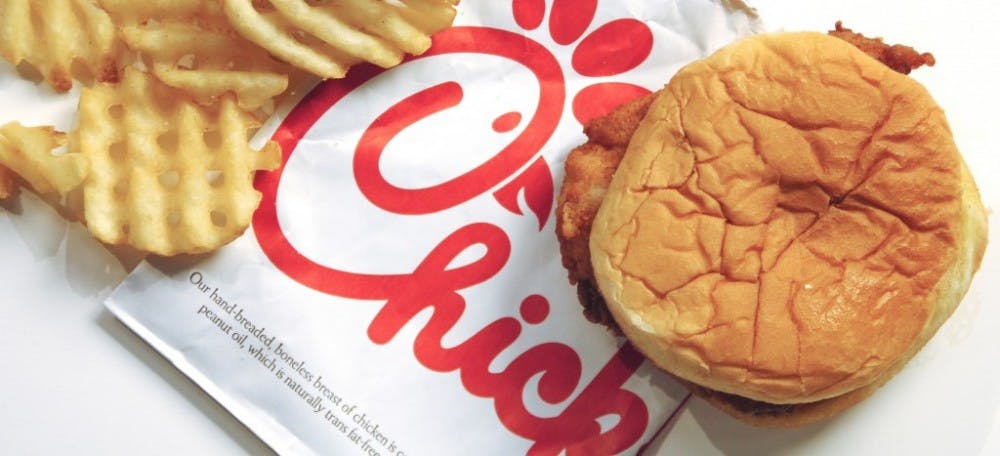Forcing out a business because you don’t agree with its political or financial decisions or owners’ moral beliefs is neither a fair nor sustainable practice.
How many shirts do you own from Urban Outfitters? How many pizzas have you ordered from Domino’s since you arrived at Elon University?
You might be surprised to find that executive leaders of each of those companies have donated money to conservative causes. Richard Hayne, CEO of Urban Outfitters, has donated more than $13,000 to Rick Santorum, a former candidate for the Republican presidential nomination. Domino’s Pizza founder Tom Monaghan financially supports pro-life organizations such as Right to Life and Operation Rescue.
Both companies are just two of a multitude of prominent businesses that have been criticized for their donations to controversial causes. Businesses like Domino’s and Urban Outfitters and their leaders have been condemned by LGBTQ activists for, according to the Human Rights Campaign, having “donated millions to groups that demonize (lesbian, gay, bisexual, transgender) people on a daily basis.”
But here at Elon, only Chick-fil-A has been singled out as a threat to Elon’s non-discrimination policies, despite students patronizing businesses and organizations whose leaders hold views similar to Chick-fil-A’s.
Recent controversy has erupted concerning statements made by Dan Cathy, the president and chief operating officer of Chick-fil-A, regarding marriage and the company’s donations to Exodus International and the Family Research Council, organizations with anti-gay marriage stances.
After Cathy’s declaration, Americans from both ends of the political spectrum turned their attention to Chick-fil-A, bombarding the company with both criticism and praise. The controversy surrounding this statement does not involve the product, but where the customers’ money is going.
The future of Chick-fil-A on campus hangs in the balance. When Cathy first expressed his support for the idea of “traditional marriage,” Elon began considering the removal of Chick-fil-A from campus, according to Smith Jackson, vice president and dean of Student Life.
Recently, Spectrum, Elon’s queer-straight alliance, submitted legislation to the Student Government Association to remove Elon’s Chick-fil-A franchise from campus. Following a brief suspension of its proposal to further investigate Chick-fil-A’s recent announcement that it would “not ... support political or social agendas,” Spectrum’s resolution has been resubmitted for a vote by SGA Oct. 11.
But despite the considerable outcry of student opinion about the propriety of Chick-fil-A’s presence on campus, the university will be the sole party involved in making the final decision.
We acknowledge the intentions of inclusivity behind Spectrum’s proposal. However, we fear the removal of Chick-fil-A from campus would set a dangerous precedent for the university.
People have the right to individually boycott a franchise, but not to enact policy to shut one down and prohibit others from making a choice to patronize it. It would mark the first step of a slippery slope at Elon for Spectrum or anyone else to suggest the university should sever business ties with any company because of its leaders’ beliefs.
First and foremost, Spectrum should not assume that their beliefs are fundamentally “right, ” while equating those who align with Cathy’s beliefs as “wrong.” There are Elon students who share similar beliefs to those held by Chick-fil-A: How are their beliefs any less valid than Spectrum’s?
This slope would get even slipperier if Chick-fil-A were removed from campus because the university believes it to clash with our policies. We would then be expected to re-evaluate the business practices of every company the university deals with.
If we are so intent on evaluating every business based off their aligning with our non-discrimination policies, then this would be an arduous task.
Kicking Chick-fil-A off campus simply because some of us do not agree with its COO’s beliefs would not paint us as a very open-minded community.
Rather, it sends a message to students that we are, in fact, not free to have our own beliefs. That, by belonging to a university, we are confined to its specifically outlined ideals and principles.
Being a part of the Elon community means we have a responsibility to acknowledge and display tolerance toward those whose ideals may contradict our own. If the only people we are willing to tolerate are those who agree with us, that’s not tolerance.
Consider the examples we mentioned earlier: Are you willing to publicly renounce shopping at Urban Outfitters, or buying pizza at Domino’s, because you don’t like their leaders’ morals?
Because when it comes down to it, who has the right to distinguish the “good” companies from the “bad” companies? The pro-gay rights groups or the abortion protestors? The people who are fighting child slavery, or the people who are disgusted by a company’s environmental practices? Who is actually “right” in this case? And in our particular situation, who should say that gay rights is the foremost issue people should be focusing on while ignoring other businesses’ practices?
Simply put, Cathy has the right to say what he said, and Chick-fil-A has the right to fund groups that oppose gay marriage. And people have the right to make their own decisions to patronize or boycott the business.
But if we have arrived at the point where students try to petition the power of their government to prevent a business from expanding simply because they disagree with the religious views of its president, we will have finally arrived at the bottom of that slippery slope.
Remember: Discrimination in response to discrimination is still wrong.


